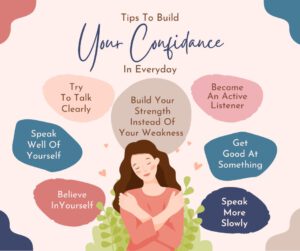Overcoming the Weakness of the Mind
 Overcoming the weakness of the mind helps to achieve important benefits for a better life and you deserve a better life for sure.
Overcoming the weakness of the mind helps to achieve important benefits for a better life and you deserve a better life for sure.
Here are some benefits of overcoming the weakness of the mind – keep them in mind when reading the guide and practicing the exercises we provide later in this article:
- Enhanced Self-confidence: Building mental strength can boost your belief in your abilities.
- Improved Decision-making: A strong mind can lead to better judgment and decision-making skills.
- Increased Resilience: Mental strength can help you bounce back from setbacks and adversity.
- Greater Productivity: Overcoming mental weaknesses can lead to improved focus and productivity.
- Better Stress Management: A strong mind is better equipped to handle stress and anxiety.
- Improved Relationships: Mental strength can lead to healthier and more fulfilling personal and professional relationships.
- Greater Life Satisfaction: Overcoming mental weaknesses can lead to a more positive outlook and greater overall life satisfaction.
- Career Advancement: Mental strength can enhance your performance at work, leading to career growth and success.
- Healthier Lifestyle: Mental strength can motivate you to maintain a healthier lifestyle, including regular exercise and a balanced diet.
- Personal Growth: Overcoming mental weaknesses allows for continuous personal development and growth.
Overcoming the Weakness of the Mind: A Simple Guide
Because of its capacity to analyze information, find solutions to difficult problems, and generate new and interesting ideas, the human mind is frequently compared to a powerful tool. Our capacity to learn, adapt, and progress is directly proportional to the strength of this drive. Because of this, we are able to construct entire civilizations, produce works of art, and investigate the cosmos. The remarkable achievements of humanity can be attributed, in large part, to the mental capacities of its members.
Sponsored Partner – The Encyclopedia of Natural Remedies
On the other hand, just like any other instrument, the human mind has its limitations. These shortcomings can manifest themselves in a variety of ways and have an impact on a variety of facets of our lives. The following are some examples:
Self-doubt is a mental weakness that many people have, in which they question their own talents or worth. It can prevent us from taking opportunities, pursuing possibilities, or realizing our full potential by holding us back from taking risks.
In today’s fast-paced and digital environment, it’s easy to become sidetracked and lose focus. This is especially true for younger generations. This may have an impact on our ability to learn new things as well as our overall mental health.
Negativity bias is the name given to the phenomena that occur when our minds have a tendency to concentrate on the unfavorable aspects of a situation. This might bring up feelings of worry and anxiety, as well as a negative attitude toward life.
In spite of these limitations, it is essential to keep in mind that they are surmountable obstacles. In the same way that we may strengthen our bodies via exercise, we can also strengthen our minds through exercise. Towards this end, it is necessary to cultivate a good mentality, gain new skills, and form new healthy habits.
In this article, our goal is to give you actionable advice that will assist you in improving the health of your mind. We will discuss motivational real-life instances of people who overcame mental obstacles on their way to achieving great achievements in their lives. In addition, we will provide you with a series of activities that are designed to enhance your ability to concentrate, build your self-confidence, and encourage positive thinking.
Therefore, let’s jump right in and investigate how we might use the power of our thoughts to overcome our shortcomings and accomplish what we set out to do.
- Meditation is a practice in which you focus your mind on a specific object, thought, or action. This helps you train your attention and awareness and reach a state in which your mind is clear and your emotions are calm and stable. You can start with guided meditations you can find online or apps that are made for people just starting out. Start by doing it for just a few minutes a day, and as you get better at it, add more time to it.
- Positive affirmations are statements that can help you fight and get rid of negative or self-defeating thoughts. They can also help you see and believe in what you’re telling yourself, which can help you make positive changes in your life and work. “I am strong and able,” “I deserve success and happiness,” and “I am getting better every day” are all good examples.
- Regular Exercise: Not only is regular exercise good for your body, but it’s also one of the best ways to improve your mental health. It can have a big effect on things like ADHD, sadness, and anxiety. It also helps you relax, remember things better, sleep better, and feel better generally. Try to exercise for at least 30 minutes most days of the week.
- Healthy Eating: What you eat has a direct effect on the way your brain looks and works, which in turn affects your mood. High-quality foods with lots of vitamins, minerals, and antioxidants are good for the brain and protect it from toxic stress. Fruits, veggies, lean proteins, and whole grains should all be a big part of your meals.
- Get enough sleep. Sleep is just as important to our health as eating, drinking, and breathing. It lets our bodies fix themselves and helps our brains remember things and process new knowledge. Poor sleep is linked to both physical and mental health problems, like a weakened immune system and anxiety and sadness. Try to sleep between 7 and 9 hours each night.
- Writing in a journal. Writing in a journal is a great way to learn more about yourself. It’s a tool that can help you get clearer and more focused in your mind, better understand your thoughts and feelings, and feel less stressed. Try to spend a few minutes a day writing in your journal about your ideas, feelings, and experiences.
- Mindfulness: Being mindful means paying attention on purpose to the current moment and accepting it without judging it. It is used to help people feel less stressed, anxious, and sad. Mindfulness is something you can do at any time, whether you’re eating, taking a shower, or walking.
- Set goals: Setting goals gives your life direction and boosts your drive and self-confidence. Start with small goals you can reach and work your way up to bigger ones. Make sure your goals are SMART, which means they are clear, measurable, doable, important, and have a deadline.
- Social connections: Having friends could help protect your health and make you live longer. Scientists are finding that the relationships we have with other people can have big effects on our mental and physical health. Whether they are with romantic partners, family, friends, neighbors, or others, social ties can affect our biology and well-being.
- Expert Help: If you’re having trouble with your mental health, don’t be afraid to ask for help from an expert. They can help you beat your mental weaknesses by giving you plans and treatments. This can include therapists, psychologists, and psychiatrists.
Remember that these tasks are not the same for everyone. Since everyone is different, it might take you a while to figure out what works best for you. Be kind to yourself and enjoy the small steps you take toward your goal. You will overcome the weakness of the mind by practicing your favorite exercises daily.

